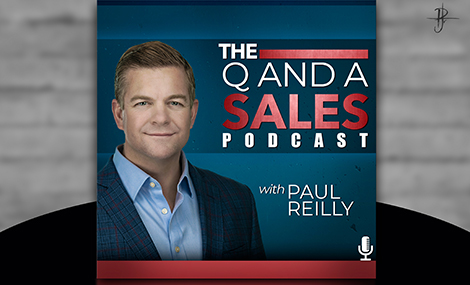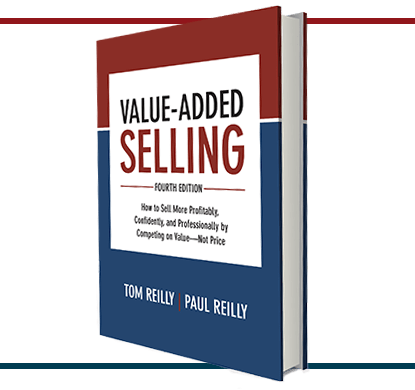Paul shares seven tips to help you become a better listener.
Have you ever met a salesperson who listened their way out of a sale?
Listening is critical, and it begins with taking the focus off your self. It’s not all about you.
If you want to become a better listener, then give yourself opportunities to listen by asking better questions.
Put down the phone, shut down your laptop, and remove those distractions.
Maintain appropriate levels of comfortable eye contact. Don’t give customers a death stare.
“Verbalize their needs so they can validate the information.”
Seek to understand not to respond.
“This tip is absolutely critical…”
Suspend your assumptions and enter the conversation with a clean slate.
Click here to purchase the latest copy of Value-Added Selling!
Thanks to our editing team at The Creative Impostor Studios. Click here to book a complimentary consultation with Andrea to find out how they can partner with you in creating your own podcast. Tell them Paul sent you.
***
Our show is updated weekly with the questions you ask. So, please go to the home page, subscribe, share it with your friends, but most importantly, ask the question that you want answered.
Thank you for tuning in. Make it a big day.
How do I become a better listener?
(Transcribed from podcast)
On today’s episode, we’re going to talk about a very important skill for any sales professional, really any business professional. We’re going to talk about listening. Now, this actually came from a recent conversation I had with a group of sales leaders. They wanted to talk about some of the areas where their salespeople can improve. And one of the areas they mentioned was listening. So that’s the question on today’s show: How do I become a better listener?
Before we get into the question, a quick shout-out to Andrea and her team, The Creative Impostor Studios. They do an absolutely incredible job. As I mentioned before, August was our biggest downloaded month so far on the podcast, and a lot of the credit goes to Andrea and her team: just her guidance, being able to answer questions when those come up. So if you’re thinking of starting a podcast or you want to schedule a consultation with Andrea, we’re going to have a link to her website on this episode’s webpage. So make sure you check it out.
Also, pick up your latest edition of Value-Added Selling. It’s available on Amazon. In the book, we actually go through some of these listening skills and things you can do to become a better listener as a sales professional.
With that being said, let’s get right into the question. Listening, first of all, is a critical skill in selling. I’ve never met a salesperson that listened their way out of a sale. I’ve met plenty that have talked their way out of a sale. And we all know those types of salespeople who just keep talking and they won’t shut up. They never listen to anything. And those are some of the pitfalls, some of the stereotypes that salespeople have had to overcome. So, we’re going to talk about how to overcome some of those challenges and how we can become a better listener.
I’m going to give you seven ideas, seven tips, to help you become a better listener. Some of these are pretty straightforward, maybe just a few reminders, but if you need to become a better listener, take the advice.
The first tip to become a better listener: take the focus off of yourself. I know this sounds pretty straightforward, but we all know that one person. You all know that one person that always talks about themselves. They make it about them. They ask you a question and then they answer their own question. They make it about them. They can’t wait for you to take a breath so they can insert their ideas, their opinions, or say something. We have to remember that deep listening is about taking the focus off of yourself and putting the focus on the other person. Before you make a sales call, make sure you remind yourself of that. It is about the customer. It’s not about you. Take the focus off of yourself. That’s just a good rule of thumb for any conversation you’re trying to generate. And if you’re trying to understand someone, you have to listen to them, and you can only do that by taking the focus off of yourself. So, it’s not about you. Keep that in mind.
Number two. You have to give yourself opportunities to listen. The best way to do that is to obviously stop talking, but to ask good questions. Good questions are great conversation pieces with your customer. Pick up a sales book. Obviously, I’m partial to Value-Added Selling, but any good sales book is going to talk about the importance of questioning, and asking open-ended questions, and how you formulate your questions. I know in value added selling, we have a complete chapter dedicated to asking the right type of question. So when you’re generating a conversation with a customer, keep your questions open ended questions that focus on them and what’s important to them. And when you ask a question, it gives you an opportunity to listen. That’s the second tip, again, is you give yourself opportunities to listen and you do that by asking the right questions.
Number three: you’ve got to remove distractions. It’s absolutely critical that you remove any sort of distraction, especially right now, when I know many salespeople are out there selling virtually where maybe they can’t see the customer, maybe the customer can’t see them. You’re just selling over the phone. It’s tempting to have your mobile device right there, or it’s tempting to look at your laptop and go online and all that stuff. The key is you have to remove any distraction that will impede your ability to listen.
Point number four, and this is important, whether we’re connecting screen-to-screen virtually with a customer, or we’re meeting with them face-to-face, maintain eye contact. You’ll notice that when you maintain eye contact with a customer, it not only helps you focus more on the conversation, but it also lets the other person know that you are listening to them. When we start gazing off into space or down at our shoes, or we look somewhere else, they might start to wonder if we’re really listening to them. Keep that in mind, that maintaining a good, solid eye contact, that is going to be helpful. And, I want to say, comfortable eye contact. I’ve met with salespeople who almost look like they’re glaring at you. They’re trying to stare into your soul. Be aware of that as well. But just maintain good eye contact. That’s going to keep you focused on the conversation. That’s tip number four, maintain eye contact.
Tip number five: provide a summary or a recap to the customer. At the end of the conversation, take a few notes. I’d make sure that you have a summary of the key points, things that the customer mentioned. Then, recite those back to the customer at the end of the call. You’re sharing with them that you understand and that you listen to them. We want to show the customer that. It also is another way for us to just verbalize their needs. And by doing that, we can also get them to validate that that is correct; that’s what they do need. And it gives us another opportunity to show that we’re demonstrating concern, that we care, that we were listening to the customer.
Number six, this is a big one, and this one can be a challenge for salespeople. We must listen with the intent to understand. That’s what we do as salespeople. Our goal is not to go in there and have a hidden agenda and try to seek out or lead the customer down a certain path. Our goal is to get in there and have a conversation with our customer so that we may understand them. Understanding is key. I remember reading a great book called The Fifth Discipline, by Peter Senge. The book has been around for a while. I think there’s over millions of copies sold. It’s called The Fifth Discipline: The Art & Practice of the Learning Organization. In his book, he talks about dialogue and how important dialogue is with teams. I would argue dialogue with customers is just as critical. He really dissects the word dialogue and what it means. He talks about the root of the word and how it means dia-logos. It refers to the free flow of meaning through a group. He said to truly dialogue— that’s what we’re going for is we want to have a free flowing of information between the people having a conversation. And that’s what we’re going for with our customers is we want to exchange information. We want to have a reflective conversation that helps us understand what’s important to them.
And he also said, to properly dialogue, you really have to suspend your assumptions when you’re entering a conversation. Suspending those assumptions. And I thought that was a great way to put it, because think of how many times salespeople will walk into a call with an agenda with what they want to talk about. The whole time, they’re going to steer the conversation towards that one thing, maybe assuming they already know what the customer needs. When we think about that, yeah, we that’s, that’s really a seller-focused approach. So again, we want to suspend those assumptions and we want to focus purely on the customer.
And, finally, the last thing we can do, and I already kind of mentioned it, take notes. If you’re ADD like me, sometimes when you’re listening to a customer… When you’re trying to listen and you can become easily distracted, if you’re able to write down notes, a few key words here and there, that will help prompt your memory when you’re later on reviewing your notes, make sure you do it. It’s something simple. It’s something easy. I know, sometimes, salespeople get concerned about taking notes in front of customers. I have no idea why. It’s just being professional. But if you’re concerned about that, just ask for your customer’s permission. When you’re asking them questions, just say, “Do you mind if I take a few notes in our conversation?” It will put their mind at ease. So just ask for some permission. You’re good to go. It’ll make it easy. Then you have something that will keep you focused on the conversation once again.
Make sure you visit TheQandASalesPodcast.com. We have the new search function that I mentioned on previous shows. So check out the website, you can search for previous episodes. You can search a question you want to ask and see if we already have a show for that. If we don’t, then fill out that question form. We have it there for a reason.
Make it a big day.


